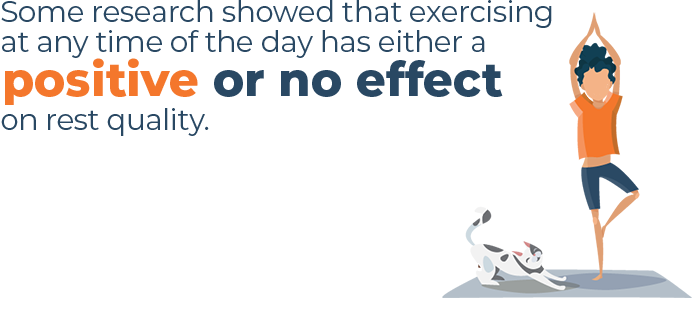I am the not-so-proud owner of a gym membership. I see the $9.99 waving “sayonara” to me every month, and yet I still struggle to find the motivation to actually workout; my card has yet to leave the designated slot in my wallet in the six months I have had it.
The mornings when I wake up exhausted have me feeling even more guilty about my lack of gym attendance. A simple Google search reveals countless results of ways that I can resolve my sleeping issues, and on almost every link is daily exercise.
For years, it has been well accepted among researchers that higher activity levels lead to a better night’s rest—but is that really the case? Recent research might suggest that the relationship between sleep and exercise may not be so simple.
Science: Sleep Quality with Exercise
Rest and exercise are the building blocks of health, and scientists have been focusing more on exactly how the two affect each other. Before we dive into the specifics, let’s take a look at the basics of sleep.
There are four types of sleep, all important with different functions: Stage 1 is when we are barely just falling asleep; we spend most of our night in stage 2, where we are lightly resting but deeper than stage 1. Stage 3, also called slow-wave, is our deepest slumber, the time when our body’s get the best rest and when our brains have time to process memories. It is what makes you feel wakeful. Rapid eye movement (REM) is generally when we dream and our brains respond similarly to when we are awake.
The more time spent in stage 3, the better. Generally, research has found that working out naturally increases the time spent in the slow-wave stage and decreases the amount spent in REM, our least restful stage.
When Should You Train to Maximize Rest?
Although it can vary from person to person, many researchers agree that exercising at least four hours before bed is best. Scientists from the Institute of Human Movement Sciences at ETH Zurich have compiled years of studies that find an increase of time in stage 3 on nights when participants exercised compared to nights without activity.
Some research they found showed that exercising at any time of day has either a positive or no effect on rest quality, even during those four hours before bed. However, this depends on the intensity of the training, and we will see how the participants of this study responded to a strenuous routine in the next section.

“The number of hours before bedtime at which the activity is performed does not matter. Benefits are similar for physical activity performed more than 8 hours before bedtime, 3 to 8 hours before, and less than 3 hours before bedtime.” — Physical Activity Guidelines for Americans, U.S. Department of Health and Human Services [1]
What Kind of Exercise Leads to the Best Rest?
The more intense the training session, the more tired you will be, right? This is not always the case. If you are working out an hour before bed, you may want to skip that last mile.
The same volunteers from the previous evaluation from ETH Zurich struggled to fall asleep after an intense workout because they did not have enough time to recover afterward. (A vigorous workout, for our purposes, is training intense enough that it is difficult to speak.) Because they trained so hard close to bed, their heart rates were still elevated, delaying slumber.
“…Patients don’t need to feel like they have to train for the Boston Marathon to become a better sleeper.”– Charlene Gamaldo, M.D., medical director of Johns Hopkins Center for Sleep at Howard County General Hospital [2]
For healthy individuals with no existing sleep disorders, a strenuous workout any other time of the day may assist with getting that deep rest, according to a study on adolescents from the Institute of Motor Control and Movement Technique at German Sport University Cologne; however, for most, a moderate, regular exercise routine will do the trick. We recommend consulting a doctor before beginning a new workout regimen.
Can Better Sleep Lead to Better Workouts?
As many have experienced firsthand, the better you rest the night preceding a workout, the more productive the following session. In a 16-week study published in Sleep Medicine journal, volunteers were randomly assigned an exercise program and were required to keep a sleep and exercise diary. They almost always worked out less the days they slept worse.
With these findings, though, we are left with a chicken and egg situation. How do we get a good workout if we already struggle to slumber at night, and how can we get better rest if we are not working out well?

The trick is consistency. The previously mentioned study also found that results were not immediate for any of the participants; in fact, only after four months did any of them show improvement. Although this can be different for everyone, if you are not seeing results right away, do not lose hope.
Can Exercise Have an Adverse Effect on Rest?
In a 2009 study, fourteen people’s activity levels were monitored for 32 days. Results showed an increase of 42 minutes of slumber on days of low activity, suggesting that exercise could actually lessen the amount of rest someone gets. Some experts say that these findings may be skewed based on the small pool of participants, however.
Most research has been done on those who already have a healthy sleep relationship. Results can differ depending on whether or not you have a disorder. If you struggle with chronic insomnia, some workouts may hurt more than help, and the timing of exercise could be more impactful.
If you are having trouble with insomnia, maybe our list of best mattresses for insomnia could be of help.
Although some studies display conflicting results, researchers agree that there is a lot more research needed in order to completely overturn the idea that working out increases quality in rest. Additionally, sleeping troubles do not excuse a lack of exercise, and 150 minutes of moderate activity levels per week are encouraged for most individuals to maintain a healthy lifestyle.
Everybody Is Different: Keep a Diary
While statistics and research can show general truths, each person may respond differently to a new routine. Discussing with a physician, keep a log of the length, intensity level, and the time of day of your workouts, as well as the length and quality of your rest. Comparing the results, adjust your exercise regimen to find what is best for you.
Conclusion
Although exercise and sleep have a more complicated relationship than once believed, most scientists believe that in general, the right exercise habits will improve the quality of your slumber.
If you are one of the lucky few that actually enjoys exercising, rejoice in the fact that you are most likely getting more rest. If you are anything like me, you may be wishing the research gave you an out. I guess I’m not canceling that gym membership after all.
Are you an athlete looking for better sleep? Consider exploring our picks for the best mattresses for athletes.

Jess Carpenter
Content Writer
About Author
Jess is only serious about a few things in life: sleeping, writing, and making the perfect chocolate chip cookie. In her free time, you’ll probably find her having a dance-off to ‘80s pop with her family or watching scary movies with her cat, Waffles.
Combination Sleeper
Sources and References:
[1] Physical Activity Guidelines for Americans, Health.gov
[2] Exercising for Better Sleep, Johns Hopkins Medicine
